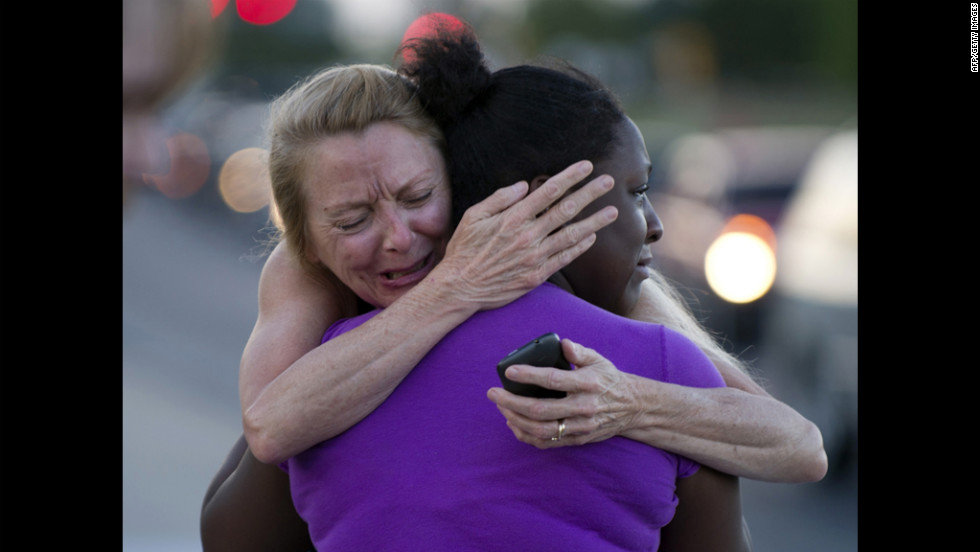I am moved by the courage of some men at Aurora, CO. It makes me reflect on the virtue of self-sacrifice even when your own life was on the line. Men still embrace the role of protector, at least three of the 12 victims of the shooting died because they were physically protecting the women they came to the movie with. I hope every husband, dads and men will have the same spirit of heroism and self-denial these men possess.
Author Hanna Rosin shared her perspective. She noted on an article at Slate, "As I’ve traveled to different middle-class towns that are struggling after the recession..., I’ve found a strained and touching effort to redefine the roles of men. They are often not the breadwinners because in that slice of America, women are often financially better off than the men. They are often not the steady fathers because couples don’t get married all that much anymore, and the women, if they are working themselves, see the men as just another mouth to feed. But one thing I find consistently is the enduring need for men to think of themselves and women to think of them as the protectors."
Read more below or read full article here:
In the movies the Dark Knight does not always save his lady, but in the Aurora theater the story unfolded differently. The male instinct to rescue and protect kicked in the way it does in less complicated superhero tales. At least three of the 12 victims of the shooting died because they were physically protecting the women they came to the movie with. Alex Teves, 24, used his body as a shield to cover his girlfriend. He was shot, and she survived. Matthew Robert McQuinn threw his body in front of his girlfriend, Samantha Yowler. He too was killed, and she was pulled to safety by her brother, Nick Yowler. Jonathan Blunk, 26, pushed his girlfriend, Jansen Young, under a seat. Again, he was killed, and she got out after the shooting was over. Young crawled out and realized she and her boyfriend were alone in the theater, only he was really wet, and she couln’t believe what had happened, so she tried to convince herself that someone must have thrown a water balloon. (Here is Young in one of the saddest Today show videos ever, her trying to match the steady upbeat tones of the format while talking about gruesome stuff: “I think John just took a bullet for me,” she says. “He provided me the opportunity to survive.”)
As always with such shooting, the papers try to portray Aurora as an all-American town that’s lost its innocence after a tragedy (“bonds of popcorn and a refuge from daily cares,” writes the New York Times). But the details that emerge from the shooting show the town to be all-American in a much less innocent way. The families in Aurora, like the families in most once-prosperous middle-class American towns, no longer look like they did. After a series of recessions, the men aren’t working as steadily, and far fewer people are married. Several women were at the midnight showing with infants and toddlers, presumably because there was no one else at home to watch them. The woman who took her 6-year-old to the movie–the 6-year-old who died–was living with her own father, the girl’s grandfather. Jonathan Blunk has an ex-wife and two children in Nevada. His ex, Chantel, was also speaking on the morning shows. On the Today show interview, Jansen Young, the girlfriend Blunk saved, mentioned that Jonathan was thinking about re-enlisting in the Navy. She attributed that to his undying heroism, but it may also have to do with the fact that he, like a few guys in the theater, was working at Target and surely not making enough money to support one family, much less two. Young, meanwhile, had just finished getting her veterinarian degree, becoming the latest in an onslaught of women who have taken over that lucrative profession, which was not very long ago dominated by men.
None of these life details are meant to detract from the men's heroism. They are only meant to make it more poignant, and even beautiful. As I’ve traveled to different middle-class towns that are struggling after the recession to report my book The End of Men, I’ve found a strained and touching effort to redefine the roles of men. They are often not the breadwinners because in that slice of America, women are often financially better off than the men. They are often not the steady fathers because couples don’t get married all that much anymore, and the women, if they are working themselves, see the men as just another mouth to feed. But one thing I find consistently is the enduring need for men to think of themselves and women to think of them as the protectors.
Couples will often insist that the man is the head of the household even when he doesn’t seem to be checking any of the traditional boxes. When I ask how it’s possible that he should retain the title without any of the attending duties, I almost always get some version of the same answer: If anyone threatened us, he would rescue us. If someone broke into the house, I would call him. If anything happened to the children, if a fire, if a tornado, etc. Papers have described what happened in the theater as "chivalry." But it's not really that. Chivalry is a code of conduct connected to social propriety. Throwing your body in front of your girlfriend when people all around you are getting shot is an instinct that's basic, and deeper. It’s the same reason these Batman and Spider-Man franchises endure: Because whatever else is fading away, women still seem to want their superhero, and men still seem to want to be him.

No comments:
Post a Comment